
The Inter-American Commission on Human Rights has found U.S. Customs and Border Protection agents who fatally beat Mexican father Anastasio Hernández Rojas responsible for acts of torture. It’s the first time the independent commission, which investigates extrajudicial killings and human rights violations, has issued such findings against a U.S. law enforcement agency. In 2010, Rojas was crossing the southern border in an attempt to return to San Diego, where he’d lived for 25 years, to reunite with his wife and five children after being deported. He was stopped by border agents, who brutally beat and tasered him while he was handcuffed, until Rojas died from heart failure. His death was later ruled a homicide.
This comes as President Trump’s nominee to head Customs and Border Protection, Rodney Scott, is accused of obstructing the criminal probe into Rojas’s killing.
The decision “exposes the unchecked powers of policing in the United States and holds the United States accountable for what is one of the worst violations in human rights, which is the taking of a life,” says Andrea Guerrero, executive director of Alliance San Diego.
Transcript
AMY GOODMAN: This is Democracy Now!, democracynow.org, The War and Peace Report. I’m Amy Goodman, with Juan González.
The Inter-American Commission on Human Rights has found Customs and Border Protection agents who fatally beat Mexican father Anastasio Hernández Rojas are responsible for acts of torture. It’s the first time the independent commission, which investigates extrajudicial killings and human rights violations, has issued such findings against a U.S. law enforcement agency.
In 2010, Rojas was crossing the southern border in an attempt to return to San Diego, where he had lived for 25 years, to reunite with his wife and five children after being deported. He was stopped by border agents, who brutally beat and tasered him, while he was handcuffed, until Rojas died from heart failure. His death was later ruled a homicide.
In 2012, Democracy Now! spoke to an eyewitness who recorded footage of the fatal beating. This is Humberto Navarrete.
HUMBERTO NAVARRETE: Anastasio face down in handcuffs and two officers in uniform. And there were five officers in the near area right there when I started recording, two uniformed officers. One of them had one of his knees on Anastasio’s neck. The other officer had one — the other knee on Anastasio’s lower back. I started noticing all these details, and the most important thing was that Anastasio was not resisting. And that’s when I decided to pull out my cellphone and start recording what you — what you can see on the first videos. And that’s when I started recording.
AMY GOODMAN: The Inter-American Commission on Human Rights’ findings on the killing of Anastasio Hernández Rojas comes nearly a decade after his family filed a complaint in 2016. And this comes as President Trump’s nominee to head Customs and Border Protection, Rodney Scott, faces questions about whether he obstructed the criminal probe into Rojas’s killing in an attempt to cover up the border agent’s actions. Democratic Senator Ron Wyden raised concerns during Scott’s confirmation hearing before the Senate Finance Committee last month.
SEN. RON WYDEN: In 2010, he led the U.S. Border Patrol in San Diego. While in that position, a migrant who crossed the border was detained by CBP officers and severely beaten while in their custody. The man we’ve mentioned, Mr. Rojas, died of those injuries, leaving behind his wife and five children. Rather than following the agency’s own policy and immediately referring the incident to outside investigators, the San Diego CBP office began its own inquiry. In the course of that investigation, CBP officers taped over the only video copy of Mr. Rojas’s death and tampered with physical evidence, according to court documents. In an action that the former head of CBP Internal Affairs called illegal and possibly obstruction of justice, Mr. Scott signed a subpoena to obtain Mr. Rojas’s medical records, which Customs and Border Patrol then refused to release to the San Diego Police Department.
AMY GOODMAN: Rodney Scott has yet to be approved by the Senate to head Customs and Border Protection.
For more, we’re joined by Andrea Guerrero. She is executive director of the San Diego Alliance.
Welcome back to Democracy Now! If you can start off by talking about the significance of the findings?
ANDREA GUERRERO: Well, good morning, Amy.
The decision from the Inter-American Commission is a catalyst in the fight for dignity in the United States. It exposes the unchecked powers of policing in the United States and holds the United States accountable for what is one of the worst violations in human rights, which is the taking of a life, and points to the U.S. policies as deficient and deadly. And that is a really significant finding for us in the fight for justice, in the fight for reform. This applies to all law enforcement, local police, federal agents, who are now being called to change their ways, and policymakers are being called to change their policies to avoid repetition, so that no one has to suffer what the family of Anastasio Hernández Rojas had to suffer
JUAN GONZÁLEZ: And, Andrea, is there any direct or legal impact of the commission’s findings on the U.S., on the U.S. government?
ANDREA GUERRERO: The way the Inter-American Commission works is it issues recommendations, and until and unless the United States complies with those recommendations, it will remain in a monitoring status. It will be monitored by the commission for the duration of its reforms. And so, the equivalent to this in the United States would be a consent decree, when a court takes a police department under its jurisdiction in a consent decree to monitor it for reforms, to make sure that it institutes the reforms to avoid repetition of the harms it has caused in the past.
And so, what we’re looking forward to is the United States complying with the recommendations of the commission, which are threefold: one, to reopen the investigation of the agents involved in both the abuse, torture, killing of Anastasio and the cover-up; two, repair the damage to his reputation and apologize to the family; and, three, to reform its laws and policies, namely, its use-of-force laws and policies, to align with the international human rights standards, which limit the use of force to that which is necessary and proportional. In the United States, we have a unique standard, unique in the world, which allows officers to use force if it is objectively reasonable. That standard is far from the international standard of necessary and proportionate, and it must change.
JUAN GONZÁLEZ: And the issue of President Trump’s pending nominee to Customs and Border Patrol, Rodney Scott, being part of that original cover-up, can you talk about the implications of that?
ANDREA GUERRERO: Yeah. Unfortunately, the CBP commissioner nominee, Rodney Scott, is implicated in the decision from the Inter-American Commission. Rodney Scott was in charge of the San Diego sector of Border Patrol when Anastasio was killed, and he directly participated in the cover-up, principally by overseeing the cover-up teams, called critical incident teams, that were later disbanded because they never had any congressional authority to operate and because of the obstruction of justice that they were engaged in.
In the case of Anastasio, Rodney Scott oversaw these teams and their destruction of evidence, and he also personally authorized an administrative subpoena that was used to acquire Anastasio’s medical records from the hospital. And the reason why this is important is because he knew that he was using an immigration subpoena for a criminal homicide matter that he had no authority to be involved in. It was an investigation of his own agents, and he used this administrative subpoena to acquire evidence or information about Anastasio’s medical records in order to mitigate the liability of his agents.
Now, everyone should know that administrative subpoenas, administrative warrants are not self-executing. They are not warrants, judicial warrants, that can compel the evidence or a witness or a person in a search or a seizure. And so, this is a violation of the Fourth Amendment. It’s a violation of federal laws that limit administrative subpoenas to administrative matters, and that’s not what Rodney Scott did. And I think what was most damning in the Senate hearing last month was that Mr. Scott said not only that he had authorized an administrative subpoena in the course of a criminal homicide investigation that he had no business being a part of, but that this was common practice and is common practice. So, you know, the way we see it is, a person who cannot recognize abuse of power or participated in abuse of power is not a person who should hold power.
AMY GOODMAN: And we will see what happens. Again, the confirmation hearing has been held, but Rodney Scott has not yet been confirmed by the full Senate to be head of Border and Customs Patrol. That does it for our show. Andrea Guerrero, we thank you so much for being with us, executive director of the San Diego Alliance. You can visit democracynow.org to see all the coverage we’ve done on the death of Anastasio Hernandez Rojas. I’m Amy Goodman, with Juan González, for another edition of Democracy Now!

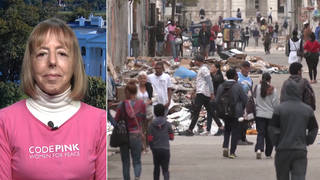
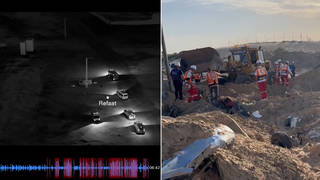
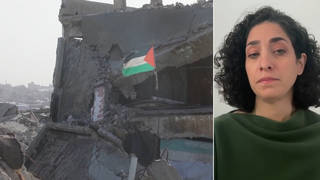
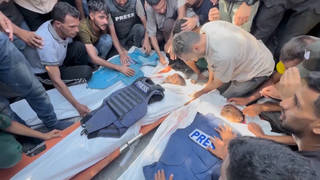





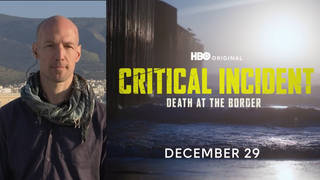

Media Options